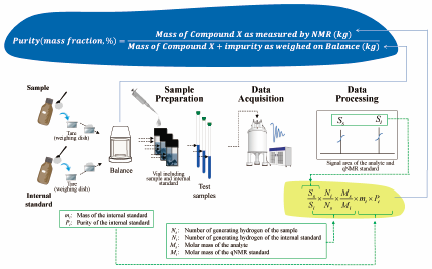NMR spectroscopy has recently been utilized to determine the absolute amounts of organic molecules with metrological traceability since signal intensity is directly proportional to the number of each nucleus in a molecule. The NMR methodology that uses hydrogen nucleus (1H) to quantify chemicals is called quantitative 1H-NMR (1H qNMR). The quantitative method using 1H qNMR for determining the purity or content of chemicals has been adopted into some compendial guidelines and official standards. However, there are still few reports in the literature regarding validation of 1H qNMR methodology. Here, we coordinated an international collaborative study to validate a 1H qNMR based on the use of an internal calibration methodology. Thirteen laboratories participated in this study, and the purities of three samples were individually measured using 1H qNMR method. The three samples were all certified via conventional primary methods of measurement, such as butyl p-hydroxybenzoate Japanese Pharmacopeia (JP) reference standard certified by mass balance; benzoic acid certified reference material (CRM) certified by coulometric titration; fludioxonil CRM certified by a combination of freezing point depression method and 1H qNMR. For each sample, 1H qNMR experiments were optimized before quantitative analysis. The results showed that the measured values of each sample were equivalent to the corresponding reference labeled value. Furthermore, assessment of these 1H qNMR data using the normalized error, En-value, concluded that statistically 1H qNMR has the competence to obtain the same quantification performance and accuracy as the conventional primary methods of measurement.

https://www.jstage.jst.go.jp/article/cpb/68/9/68_c20-00336/_article/-char/ja/